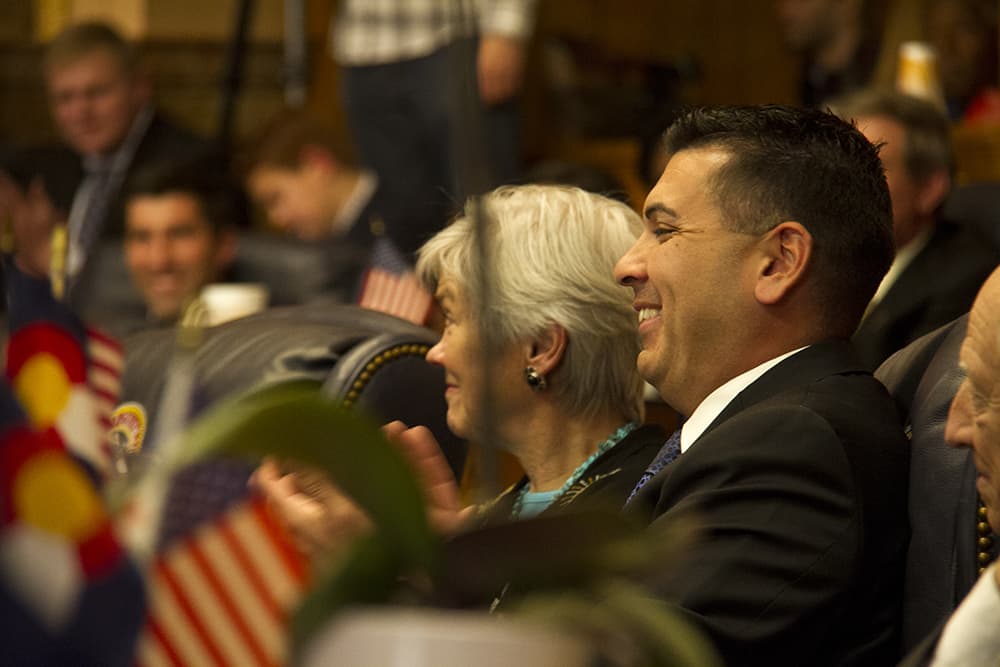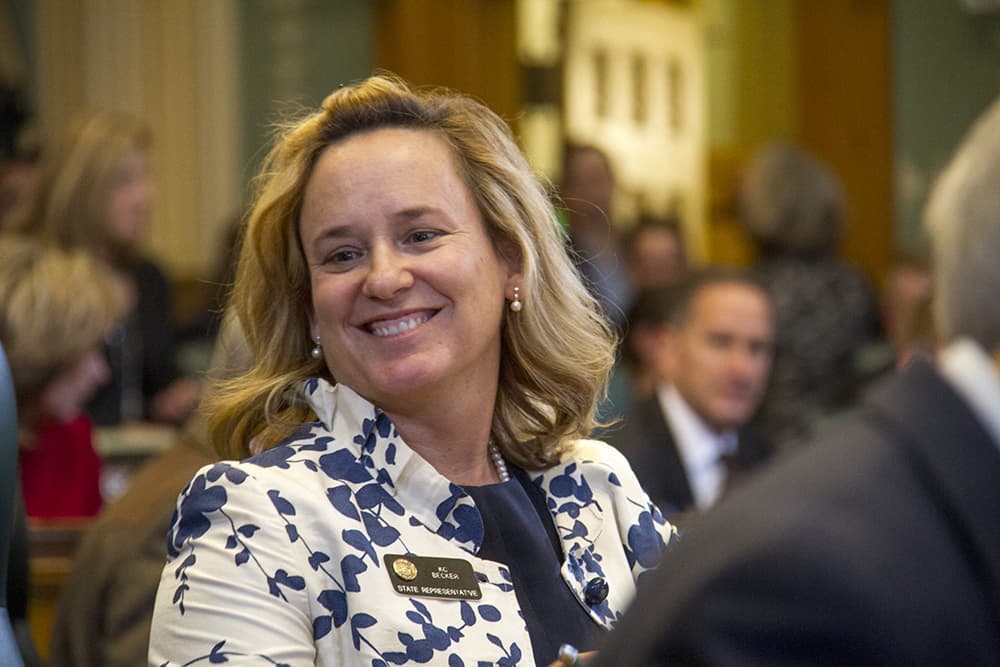It all came together for Colorado Democrats on election night.
The vibe at their watch party in Denver last week was Friday night before a three-day weekend. They found themselves celebrating win after win, with only a few losses that didn't involve local races prompting partygoer groans.
Speaking after governor-elect Jared Polis gave his victory speech, U.S. Rep. Diana DeGette -- fresh off her most recent shellacking of a Republican candidate -- made a proclamation on stage during the watch party.
"Colorado is no longer a purple state. We're blue," DeGette said to raucous cheering.
Yes, the so-called blue wave became a real-deal blue hurricane, at least in Colorado. Democrats swept everything in sight -- and by pretty wide margins. They won all four executive offices, they flipped the state Senate and kept the state House.

"There wasn't a blue wave nationally but there sure was one in Colorado last night," Democratic consultant Steve Welchert said last week. "That's clear. Democrats themselves are surprised by some of the turnouts, some of the results."
Democrats had not swept all statewide offices in Colorado since 1936, according to the party; the last time that happened was when the guy on the dime was president. Welchert couldn't remember the last time Democrats had this much power when they "cleaned up" like this.
With such a sweeping win, did Tuesday signal the end of Colorado as a purple state? And worse, signal the beginning of the end of the Republican party's golden boy?
"You know, I think what you can definitely say is that the trend is getting bluer and bluer and bluer," Welchert said. "It doesn't mean Republicans aren't going to win further. It just means it's more of an uphill walk."
Now that it's all said and done, though, what will Democrats make of this?
"The festivities ended very quickly," State Sen. Leroy Garcia of Pueblo said this week. "People were ready to get to work."
Garcia will be the first Latino President of the Senate when the legislature convenes in January. He will lead a party with a 19-16 advantage in the Senate over Republicans.
He said Democrats are "excited by the opportunity to lead Colorado forward" and will likely focus on "bread and butter issues impacting everyday Coloradans" like education funding.

Garcia mentioned affordable housing and the opioid crisis as two other potential topics the new legislature will address.
"Education is a top priority," Garcia said, adding healthcare will be another priority. "This is really important to us and our and quality of life here."
His thinking aligns with what Welchert said will be needed for Dems to have success.
"They need to be thoughtful and they need to be pragmatic," Welchert said, adding the majority-blue legislature will need to solve problems, not create political fights. "Do the bread and butter ... do the dining room table issues that people hired you to do."
That means staying away from more controversial issues, he said, like the death penalty, or maybe even gun control legislation, referring back to a bad chapter for Democrats in the Senate. After passing gun control bills in the wake of the Aurora theater shooting, two Democrats in the state Senate including then-state Sen. President John Morse were recalled in 2013.
Tom Sullivan -- father of Alex Sullivan, one of the 12 victims murdered during the Aurora theater shooting -- was a big winner for Democrats last week. He unseated Republican incumbent Cole Wist to win a house district seat that includes Aurora and Centennial.
Sullivan said he's already spoken with House leadership about some of his plans, which will include reintroducing the red flag bill (which Wist supported) that failed during the last session.
The bill would have allowed police and family to obtain court orders requiring them to surrender firearms. At least eight states have already passed a similar law.
"My hope is they are going to let me be a part of that," Sullivan said. But he's not being overly confident about its passing. "What we have to do and what I've always done is work. And that is what I will do ... that work is what it takes to make our community safer."
Part of what made so many Democratic candidates successful was their attention to the community's needs, Garcia said.
"Candidates who won a week ago won so by being very in-tune to their communities about what their communities wanted," Garcia said.
Welchert said a big focus for the new legislature will be addressing the state's transportation infrastructure, which failed to get any solution last week. Two competing ballot measures failed.
"Voters didn't care for the two models they were provided," Welchert said.
ProgressNow Executive Director Ian Silverii -- who's married to Brittany Pettersen, whose election helped keep a Democratic seat in the Senate -- said transportation itself will need to be addressed.
"I know there are a lot of legislators that want to focus on trying to figure out how to handle growth in Colorado," Silverii said, adding this will include increasing public transit and other transportation alternatives to get around the state.
As Garcia mentioned, healthcare is another big discussion point. It's a topic Polis will no doubt be eager to discuss since he built his progressive platform on pushing for universal health care in the state. Polis will be moving from a legislative role into an executive role, which Welchert said should be taken into account.

"Polis has some very aggressive healthcare proposals and those things take revenue that I'm not sure where that comes from," Welchert said. "They got to figure some of those things out."
One potentially non-partisan issue Welchert said this GA should consider tackling: Sports gambling. He thinks sports gambling could be something Polis will try to figure out the next steps to implementing Colorado. The U.S. Supreme Court cleared the way for states to make their own rules about it after striking down a federal law in May.
It could be regulated and taxed like recreational marijuana, and like legal weed, lead to what Welchert said could be potential new "significant sources of revenue."
House Speaker-designate KC Becker of Boulder said Polis' agenda encompasses many of the things the new legislature will look to address, like reducing healthcare costs and increase access to it.
But there will also be a renewed focus on criminal justice reform, environmental protection and budget issues (which Becker said include education funding). Toss in passing paid family medical leave and you've got potential bills the legislature wasn't able to pass due to Republican resistance.
"We think voters made a strong statement that they want Democrats to lead," Becker said. "But our efforts are going to move forward with helping Coloradans move ahead and govern responsibly."
Outgoing House Speaker Crisanta Duran isn't sad about missing a chance to be a part of the Democrat-held General Assembly.
She's been a part of a split legislature through her legislative career, though she believes the "Democratic trifecta" is a chance to get things done.
"I think the people of Colorado spoke loud and clear about the direction that our state should go in," Duran said. " And yet again, Colorado, I believe, will continue to lead the nation in the right direction going into 2020."
Duran believes the new legislature will tackle paid family leave and equal pay for women and communities of color.
Silverii also believes the General Assembly's to-do list will include addressing paid family and medical leave, a bill he said has tried and failed through the legislature several times.
He thinks the new legislature will try to pass bills making college more affordable by either passing tuition caps, ensuring interest rates from private company loan low or expanding programs that provide concurrent enrollment for students to attend college while they're still in high school.

"I think that there is a clear mandate that Colorado wants an economy that works for everyone, not just those at the top," Duran said. She believes there will be new initiatives promoting more small businesses and encouraging entrepreneurialism in the state.
Duran's replacement, Becker, will be the third consecutive woman to hold the position of Speaker of the House and the fourth-ever. She previously served as Majority Leader and will be starting her fourth and final term in the General Assembly next year.
"I think it's going to be productive," Becker said about the upcoming session. "We're going to try and work across the aisle. If we can't get Republican support for some of these things, we're going to move forward."













